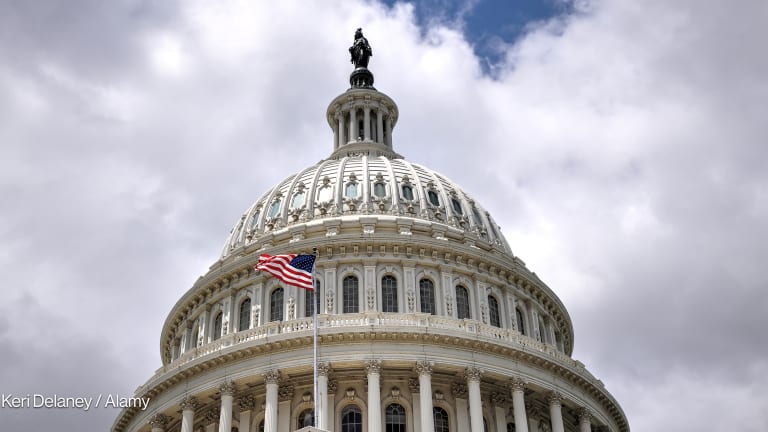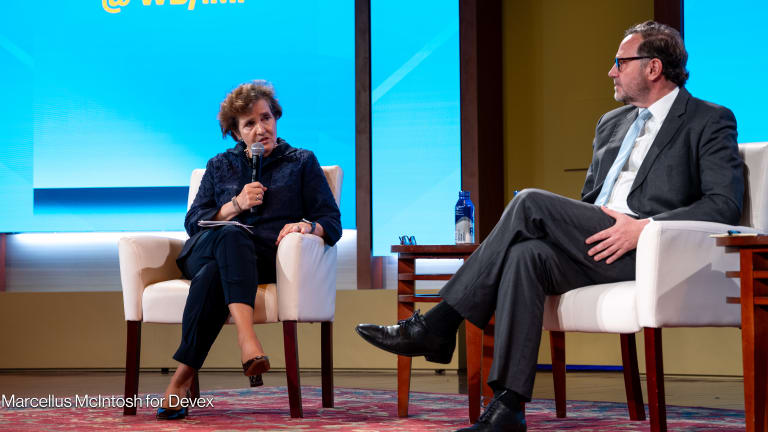
WASHINGTON — The new U.S. International Development Finance Corporation may not be officially up and running yet, but the agency’s new CEO Adam Boehler has been sworn in and is ready to manage an organization he describes as “more proactive, forward-leaning, and strategic.”
Boehler met with the staff of the future DFC — still technically employed by the Overseas Private Investment Corporation and the U.S. Agency for International Development until Congress passes a budget providing funding for the new agency — on Wednesday, beginning what he sees as an effort to build an agency that is more flexible and can be more thoughtful about sourcing deals.
On the Congress delay: “I think all this does is buy a short period of time to prepare even more and really hit the ground running, so I doubt we lose much footing,”
— Adam Boehler, CEO, US DFC“When you have a new organization, there is a culture change and one of the things that I know we need to focus on is how do we maintain the entrepreneurial spirit, the flexibility, and some of the best things there are ... about OPIC while orienting within a broader U.S. government context and not getting over bureaucratized,” Boehler told Devex on Wednesday, in his first interview since taking up the position.
Boehler wants to align the agency more closely with other parts of the U.S. government, particularly USAID, to better leverage resources, he said, adding that he’d also like to work more closely with U.S. allies and co-invest alongside their development finance institutions.
“I think you will see a doubling down in focusing on development, that’s not going anywhere,” he said. “Now, I don't believe that having a national security and policy orientation has to be apart from that. I think the two can coexist in a very nice way.”
More on US DFC
► Failure to launch: Why congressional budget drama delayed US DFC
While Boehler isn’t well known in the development community, he said that his past experience in domestic and international investment, as an entrepreneur, and running the Center for Medicare and Medicaid Innovation has prepared him for this job.
Boehler said he believes that a great CEO really knows their strengths and knows where they need to partner and listen. He started Landmark Health, one of the largest in-home medical businesses in the U.S., but isn’t a doctor or a clinician so he relied on his chief medical officer and clinical staff.
“The analogy holds true here from a development perspective,” he said, adding that he will work closely with the agency’s chief development officer and career staff at the agency. “My job as a CEO in all areas is to listen and to harness and empower that talent.”
Getting a chief development officer in place is one of Boehler’s top priorities and the process is underway — the job has been posted and the agency is beginning to gather those applications, he said.
While the agency is in limbo, Boehler said he will work closely with David Bohigian, acting president and CEO of OPIC. And while the budget woes have delayed the official launch, the agency was unlikely to be writing equity checks immediately, despite the preparation that has been underway since the Better Utilization of Investment Leading to Development Act was signed into law, creating the agency.
“I think all this does is buy a short period of time to prepare even more and really hit the ground running, so I doubt we lose much footing,” Boehler said.
One of the key issues as the budget process has played out is how much money the new agency will be able to invest in equity and how that money will be scored for budget purposes. The current scoring would require equity to be treated similar to grants, whereas advocates want to see a system where a loss reserve fund could be used to leverage a greater amount of equity funding. Boehler said that he doesn’t think there is too much difference between what different parties want, and that there are different avenues to ensure that the agency has the capital it needs.
“I feel I have a decent sense of Congress’ intent by reading the BUILD Act and my main job in advocating with the administration, with Congress, is to make sure that we live up to the full potential of the BUILD Act and are not limited,” he said.
In preparation for his Senate confirmation hearing, and for the job, Boehler met with past OPIC presidents, USAID Administrator Mark Green, development leaders, and members of Congress.
In his conversations with Green and Deputy Administrator Bonnie Glick, Boehler discussed how the agencies can work together so that the DFC has feet on the ground and blended funds, enabling it and USAID to use grants and private capital to address key issues.
“As you know, we're not overflowing with staff at DFC … we've had a doubling of assets in DFC but no change in staff, which is something we have to think about,” he said. “We need to have the conversation with Congress and the administration about making sure we're adequately resourced.”
While it is important that the agency continues to return money to the U.S. Treasury, not every deal has to make money, particularly if there is a strong development need, Boehler said.
“I want to be forward leaning,” he added.








